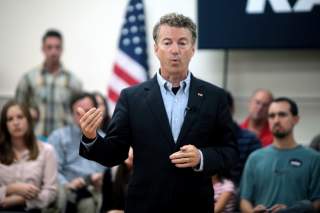Fox Business Network GOP Debates: The Winners and Losers
Did Trump 'tower' over the competition? Did Rand find his voice? What about Rubio?
The one thing that is clear from yesterday’s GOP debate in Milwaukee is that the race itself isn’t any clearer. If no one scored a slam-dunk, it’s also the case that no one flamed out.
Jeb Bush, who had been in a state of suspended animation, became slightly more energetic.
Donald Trump went to his signature immigration issue. Florida Senator Marco Rubio was his usual polished and slick self. And Kentucky Senator Rand Paul, for the first time, displayed some real passion by reverting to his signature libertarian credo and shaking up the political correctness that surrounds the GOP’s discussion of foreign affairs.
The Paul who had back in September blasted Obama’s Iran deal disappeared. He’s morphing back into his old self, sounding like Dwight Eisenhower warning about an encroaching military-industrial complex. When the moderators asked about tax plans, Paul used it as an opportunity to single out defense spending. Paul’s line is as clear as it is basic: lavish military outlays are incompatible with traditional conservative fiscal prudence. He’s suggesting that it’s a neoconservative, not Republican, approach to foreign affairs.
Indeed, Paul had telegraphed this strategy a few days ago when he announced that as regards Hillary Clinton:
I see her as a neoconservative. I see her and Rubio as being the same person. They both wanted a no-fly zone. They both have supported activity in Libya -- the war in Libya that toppled Gadhafi, an intervention that made us less safe. They both have supported pouring arms into the Syrian civil war, a mistake that I think allowed ISIS to grow stronger. And they both have supported the Iraq War. So I mean, what's the difference?
Now Paul once more directly assailed intervention in Syria and the second Iraq War. Eager to enmesh America in Syria? Then “be ready to send your sons and daughters to another war in Iran. I don't want to see that happen. I think the first war in Iraq was a mistake.” Rubio responded that Paul is a “committed isolationist,” the kind of fellow who have sat by idly as Hitler gobbled up Europe. Meanwhile, Trump—unlike the medical doctor Ben Carson, who explained that countering Russia in Syria was imperative because “we have to recognize is that Putin is trying to really spread his influence throughout the Middle East. This is going to be his base. And we have to oppose him there and in an effective way”--seemed to be drifting toward Paul’s position, at least when he announced that it wasn’t such a bad thing to have Russian President Vladimir Putin take on the Islamic State.
For all his fervor, Paul’s approach is unlikely to make much of a dent in this election with an American public alarmed by the rise of the Islamic State and by the general chaos in the Middle East.
The same cannot be said for the rise of Trump who was invigorated, at least when contrasted with his last debate performance, where he seemed rather somnolent, a frontrunner coasting along. Not this time. He announced, “We are a country of laws. We need borders. We will have a wall… And if you think walls don’t work, all you have to do is ask Israel.” Jeb Bush rejoined that “They’re doing high-fives in the Clinton campaign right now when they hear this.”
But the GOP race isn’t about the Clinton campaign. Right now it’s about appealing to Republican voters. The confrontation between establishment and populist insurgents over issues such as immigration in this primary will likely go a long way toward setting the party’s direction in coming years, not just in the 2016 election. Whether or not Trump receives the nomination, he seems likely to exercise a large role at the Republican convention. A nominee would want to receive his benison rather than have Trump, whatever his formal promises, embark upon a campaign as an independent. This is why Senator Ted Cruz chimed in that “If Republicans join Democrats as the party of amnesty, we will lose.” The blunt fact is that to motivate the Tea Party base in a general election a Republican presidential candidate will have to adopt a tough line on immigration, not just pay lip-service to it.
When it comes to economics, the disputes among the candidates are nowhere near as sharp. When asked about raising the minimum wage to $15 an hour, Trump and Ben Carson demurred, while John Kasich mildly observed, “People need help.”
Probably the person who had the most effective line, though, was Governor Chris Christie who was relegated to the second-tier debate. With his customary feistiness, he said, “Hillary Clinton's coming for your wallet, everybody.” He’s right.
Jacob Heilbrunn is editor of the National Interest.
Image: Flickr/Creative Commons/Gage Skidmore.

